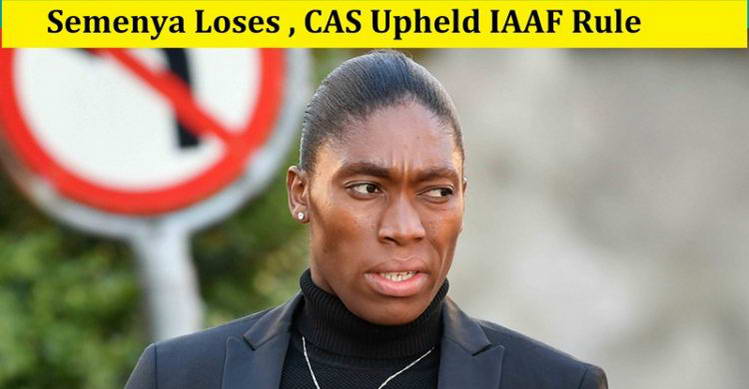Caster Semenya loses landmark legal case against IAAF over testosterone levels
The surprise decision, which was announced by the Court of Arbitration for Sport after three judges had spent more than two months deliberating over the complex and highly contentious case, came even though Cas agreed that the IAAF’s policy was discriminatory to athletes with differences in sexual development (DSDs) such as Semenya. In a statement Cas said Semenya’s team had been unable to prove the IAAF’s policy was “invalid”. Instead it ruled that its policy was in fact “necessary, reasonable and proportionate” to ensure fair competition for females.
It added: “The panel found that the DSD Regulations are discriminatory but that, on the basis of the evidence submitted by the parties, such discrimination is a necessary, reasonable and proportionate means of achieving the IAAF’s aim of preserving the integrity of female athletics in the Restricted Events.”
However, in a 165-page award, the CAS Panel expressed some serious concerns as to the future practical application of these DSD Regulations, leaving open the possibility of future changes in regulations. “While the evidence available so far has not established that those concerns negate the conclusion of prima facie proportionality, this may change in the future unless constant attention is paid to the fairness of how the Regulations are implemented,” it said in a statement.
The sports scientist Ross Tucker, who was part of Semenya’s team of experts at CAS last month, believes it will mean the South African will run the 800m around seven seconds slower – turning her from a world beater into an also ran in that event and the 1500m with the IAAF policy to apply from 400 to one mile.
Semenya had taken the IAAF to court over its plans requiring female athletes with differences in sexual development (DSDs) – who are often born with male testes – to take hormone suppressants, arguing that the policy was discriminatory, unfair, and potentially posed a health risk.
However during the five-day hearing last month, the IAAF maintained that its policy was solely about creating a level playing field for all woman, so that success was based on talent and hard work. Central to its case was that over 99% of females have around 0.12-1.79 nmol/L of testosterone in their bodies – while DSDs like Semenya are in the male range of 7.7-29.4 nmol/L.
The IAAF’s argument was that because testosterone confers significant advantages in size, strength and power from puberty onwards, it was fair to require DSD athletes to reduce their testosterone to below five nmol/L for at least six months if they wanted to compete internationally at distances ranging from 400m to a mile.
That policy, which the IAAF had intended to introduce last November before Semenya’s legal challenge, will now be enacted with immediate effect.
Dr Stéphane Bermon, who heads the IAAF’s health and science department, told the Guardian that the policy would ensure fairness of competition.
“Historically the reason why we have separate male and female categories is that otherwise females would never win any medals,” he said. “Testosterone is the most important factor in explaining the difference. We are talking about females competing with levels similar to males. Very often it is more than 20 or 25nmol/L. So it is very high.”(Thetheguardian)
